Group Learning Principles, Context & Theories in Medical Education
VerifiedAdded on 2023/05/28
|8
|1936
|423
Report
AI Summary
This report provides an analysis of group learning principles, context, and learning theories within the framework of medical education, specifically focusing on medical biochemistry. The first task describes a medical biochemistry program, emphasizing its importance in diagnosis, treatment selection, and technological advancement in healthcare. It details teaching methods, including the use of study aids, educational films, and laboratory sessions designed to foster independent scientific experimentation. The second task analyzes teaching sessions, considering principles of group learning such as preparation, strategy, structure, support, and assessment. It also examines the role of context in creating effective learning environments and explores various learning theories, including behaviorism, cognitivism, and constructivism, highlighting their applications in medical education. The report concludes by emphasizing the importance of these theories in selecting appropriate teaching strategies based on the learners' educational level and desired outcomes.
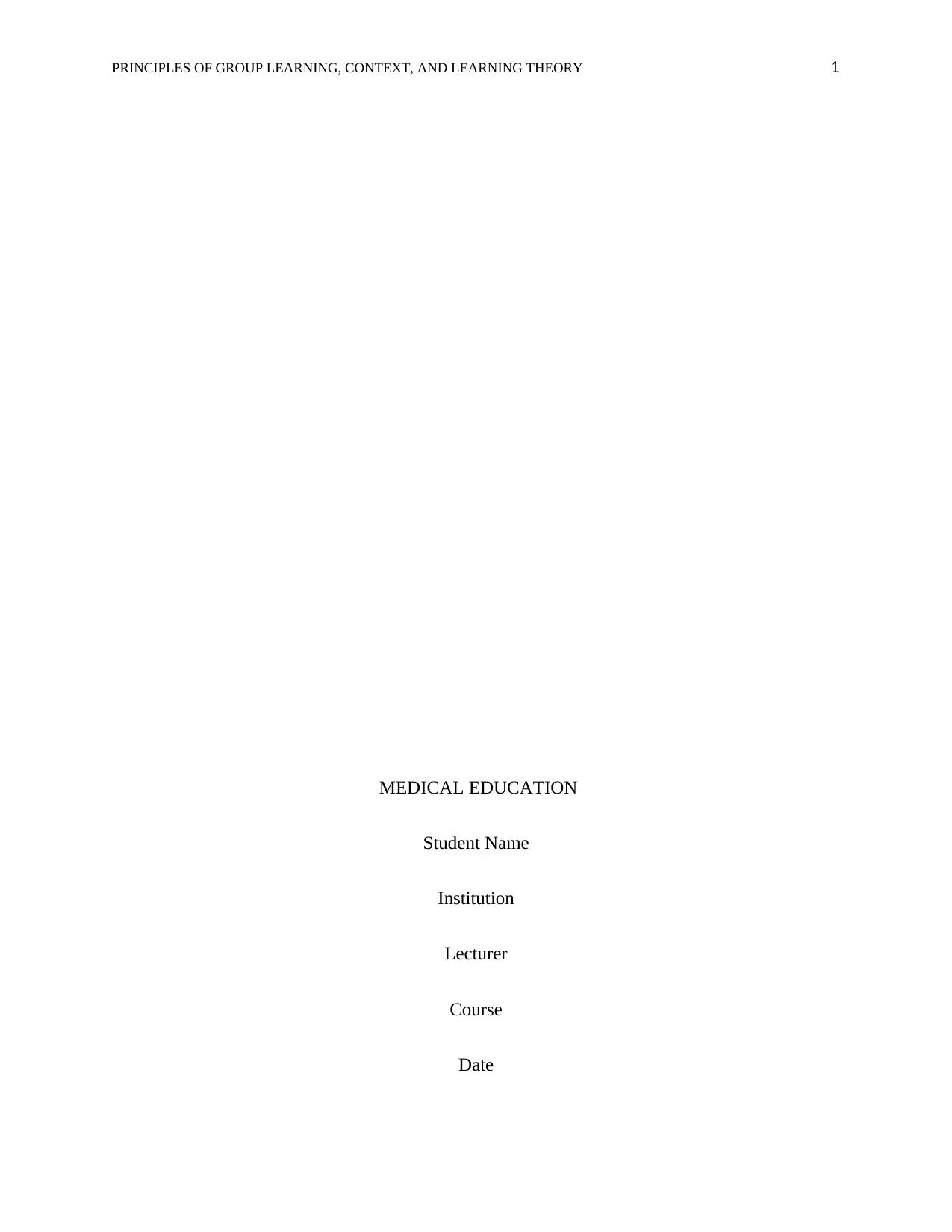
PRINCIPLES OF GROUP LEARNING, CONTEXT, AND LEARNING THEORY 1
MEDICAL EDUCATION
Student Name
Institution
Lecturer
Course
Date
MEDICAL EDUCATION
Student Name
Institution
Lecturer
Course
Date
Paraphrase This Document
Need a fresh take? Get an instant paraphrase of this document with our AI Paraphraser
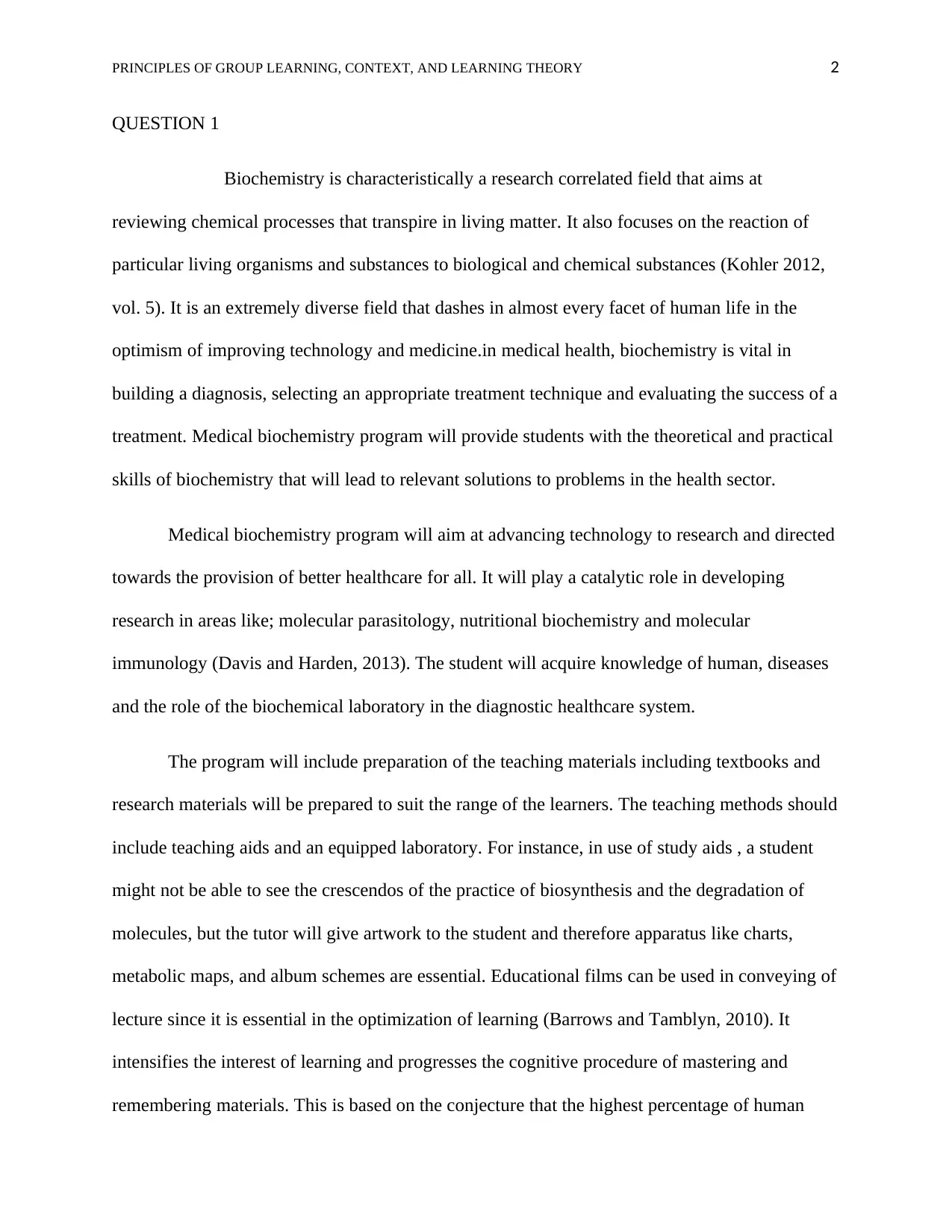
PRINCIPLES OF GROUP LEARNING, CONTEXT, AND LEARNING THEORY 2
QUESTION 1
Biochemistry is characteristically a research correlated field that aims at
reviewing chemical processes that transpire in living matter. It also focuses on the reaction of
particular living organisms and substances to biological and chemical substances (Kohler 2012,
vol. 5). It is an extremely diverse field that dashes in almost every facet of human life in the
optimism of improving technology and medicine.in medical health, biochemistry is vital in
building a diagnosis, selecting an appropriate treatment technique and evaluating the success of a
treatment. Medical biochemistry program will provide students with the theoretical and practical
skills of biochemistry that will lead to relevant solutions to problems in the health sector.
Medical biochemistry program will aim at advancing technology to research and directed
towards the provision of better healthcare for all. It will play a catalytic role in developing
research in areas like; molecular parasitology, nutritional biochemistry and molecular
immunology (Davis and Harden, 2013). The student will acquire knowledge of human, diseases
and the role of the biochemical laboratory in the diagnostic healthcare system.
The program will include preparation of the teaching materials including textbooks and
research materials will be prepared to suit the range of the learners. The teaching methods should
include teaching aids and an equipped laboratory. For instance, in use of study aids , a student
might not be able to see the crescendos of the practice of biosynthesis and the degradation of
molecules, but the tutor will give artwork to the student and therefore apparatus like charts,
metabolic maps, and album schemes are essential. Educational films can be used in conveying of
lecture since it is essential in the optimization of learning (Barrows and Tamblyn, 2010). It
intensifies the interest of learning and progresses the cognitive procedure of mastering and
remembering materials. This is based on the conjecture that the highest percentage of human
QUESTION 1
Biochemistry is characteristically a research correlated field that aims at
reviewing chemical processes that transpire in living matter. It also focuses on the reaction of
particular living organisms and substances to biological and chemical substances (Kohler 2012,
vol. 5). It is an extremely diverse field that dashes in almost every facet of human life in the
optimism of improving technology and medicine.in medical health, biochemistry is vital in
building a diagnosis, selecting an appropriate treatment technique and evaluating the success of a
treatment. Medical biochemistry program will provide students with the theoretical and practical
skills of biochemistry that will lead to relevant solutions to problems in the health sector.
Medical biochemistry program will aim at advancing technology to research and directed
towards the provision of better healthcare for all. It will play a catalytic role in developing
research in areas like; molecular parasitology, nutritional biochemistry and molecular
immunology (Davis and Harden, 2013). The student will acquire knowledge of human, diseases
and the role of the biochemical laboratory in the diagnostic healthcare system.
The program will include preparation of the teaching materials including textbooks and
research materials will be prepared to suit the range of the learners. The teaching methods should
include teaching aids and an equipped laboratory. For instance, in use of study aids , a student
might not be able to see the crescendos of the practice of biosynthesis and the degradation of
molecules, but the tutor will give artwork to the student and therefore apparatus like charts,
metabolic maps, and album schemes are essential. Educational films can be used in conveying of
lecture since it is essential in the optimization of learning (Barrows and Tamblyn, 2010). It
intensifies the interest of learning and progresses the cognitive procedure of mastering and
remembering materials. This is based on the conjecture that the highest percentage of human
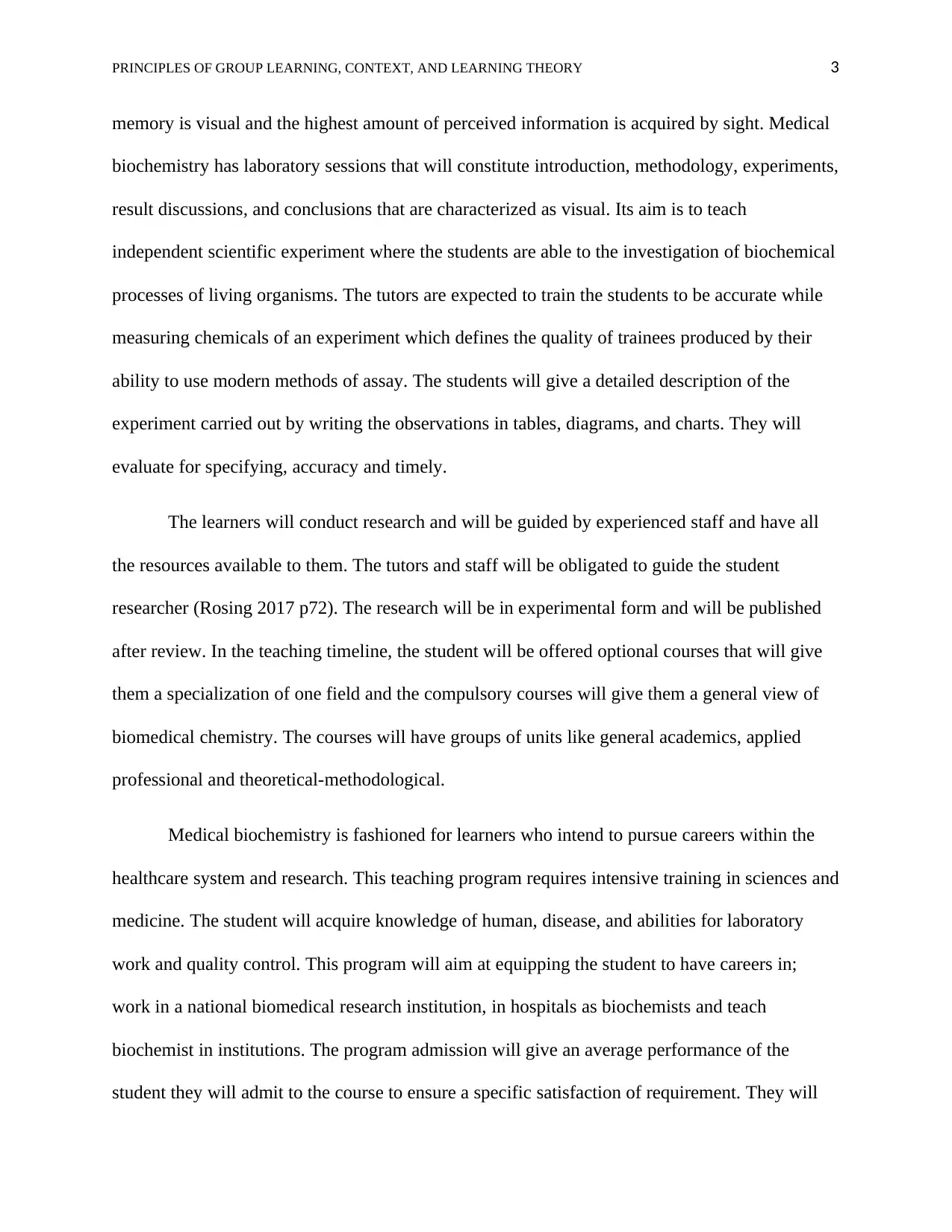
PRINCIPLES OF GROUP LEARNING, CONTEXT, AND LEARNING THEORY 3
memory is visual and the highest amount of perceived information is acquired by sight. Medical
biochemistry has laboratory sessions that will constitute introduction, methodology, experiments,
result discussions, and conclusions that are characterized as visual. Its aim is to teach
independent scientific experiment where the students are able to the investigation of biochemical
processes of living organisms. The tutors are expected to train the students to be accurate while
measuring chemicals of an experiment which defines the quality of trainees produced by their
ability to use modern methods of assay. The students will give a detailed description of the
experiment carried out by writing the observations in tables, diagrams, and charts. They will
evaluate for specifying, accuracy and timely.
The learners will conduct research and will be guided by experienced staff and have all
the resources available to them. The tutors and staff will be obligated to guide the student
researcher (Rosing 2017 p72). The research will be in experimental form and will be published
after review. In the teaching timeline, the student will be offered optional courses that will give
them a specialization of one field and the compulsory courses will give them a general view of
biomedical chemistry. The courses will have groups of units like general academics, applied
professional and theoretical-methodological.
Medical biochemistry is fashioned for learners who intend to pursue careers within the
healthcare system and research. This teaching program requires intensive training in sciences and
medicine. The student will acquire knowledge of human, disease, and abilities for laboratory
work and quality control. This program will aim at equipping the student to have careers in;
work in a national biomedical research institution, in hospitals as biochemists and teach
biochemist in institutions. The program admission will give an average performance of the
student they will admit to the course to ensure a specific satisfaction of requirement. They will
memory is visual and the highest amount of perceived information is acquired by sight. Medical
biochemistry has laboratory sessions that will constitute introduction, methodology, experiments,
result discussions, and conclusions that are characterized as visual. Its aim is to teach
independent scientific experiment where the students are able to the investigation of biochemical
processes of living organisms. The tutors are expected to train the students to be accurate while
measuring chemicals of an experiment which defines the quality of trainees produced by their
ability to use modern methods of assay. The students will give a detailed description of the
experiment carried out by writing the observations in tables, diagrams, and charts. They will
evaluate for specifying, accuracy and timely.
The learners will conduct research and will be guided by experienced staff and have all
the resources available to them. The tutors and staff will be obligated to guide the student
researcher (Rosing 2017 p72). The research will be in experimental form and will be published
after review. In the teaching timeline, the student will be offered optional courses that will give
them a specialization of one field and the compulsory courses will give them a general view of
biomedical chemistry. The courses will have groups of units like general academics, applied
professional and theoretical-methodological.
Medical biochemistry is fashioned for learners who intend to pursue careers within the
healthcare system and research. This teaching program requires intensive training in sciences and
medicine. The student will acquire knowledge of human, disease, and abilities for laboratory
work and quality control. This program will aim at equipping the student to have careers in;
work in a national biomedical research institution, in hospitals as biochemists and teach
biochemist in institutions. The program admission will give an average performance of the
student they will admit to the course to ensure a specific satisfaction of requirement. They will
⊘ This is a preview!⊘
Do you want full access?
Subscribe today to unlock all pages.

Trusted by 1+ million students worldwide
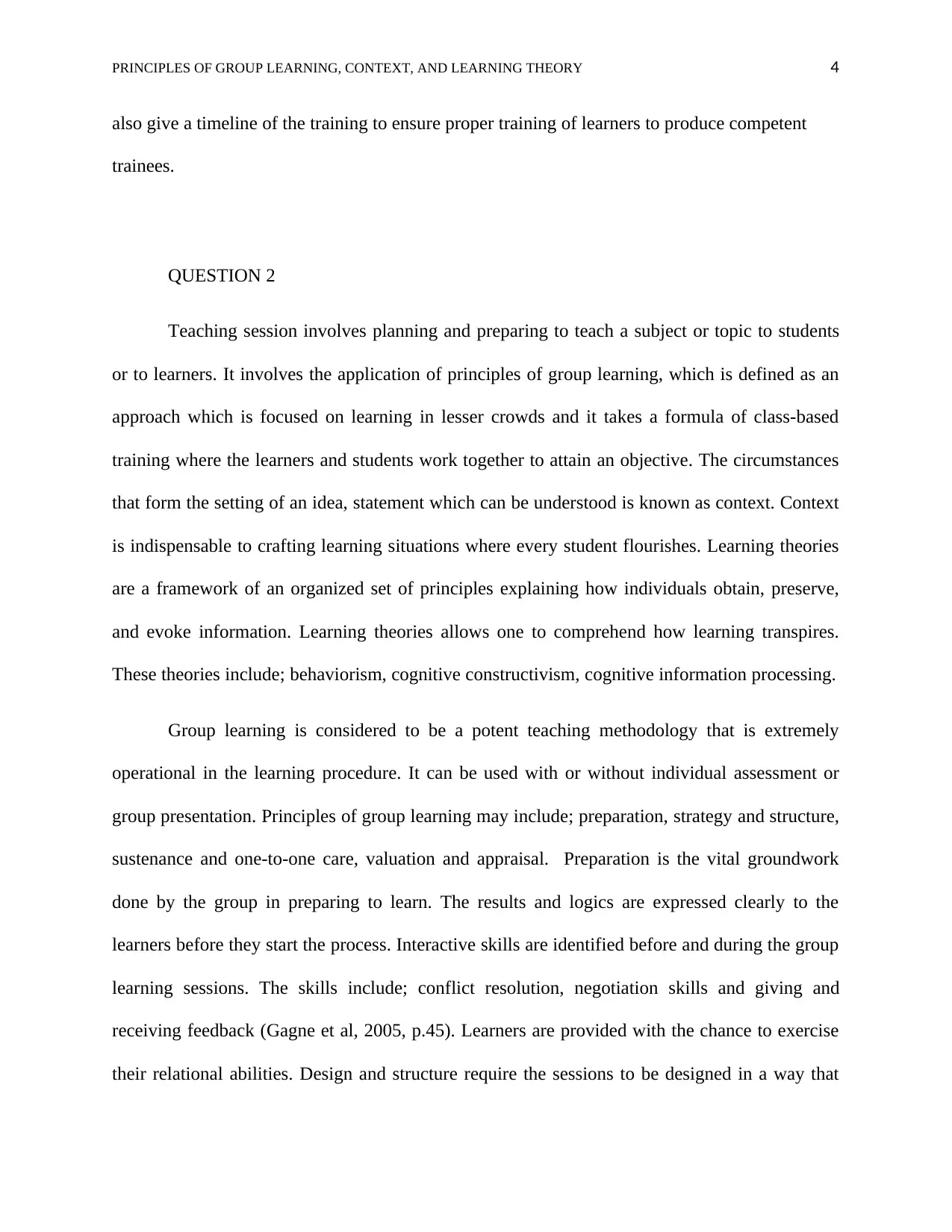
PRINCIPLES OF GROUP LEARNING, CONTEXT, AND LEARNING THEORY 4
also give a timeline of the training to ensure proper training of learners to produce competent
trainees.
QUESTION 2
Teaching session involves planning and preparing to teach a subject or topic to students
or to learners. It involves the application of principles of group learning, which is defined as an
approach which is focused on learning in lesser crowds and it takes a formula of class-based
training where the learners and students work together to attain an objective. The circumstances
that form the setting of an idea, statement which can be understood is known as context. Context
is indispensable to crafting learning situations where every student flourishes. Learning theories
are a framework of an organized set of principles explaining how individuals obtain, preserve,
and evoke information. Learning theories allows one to comprehend how learning transpires.
These theories include; behaviorism, cognitive constructivism, cognitive information processing.
Group learning is considered to be a potent teaching methodology that is extremely
operational in the learning procedure. It can be used with or without individual assessment or
group presentation. Principles of group learning may include; preparation, strategy and structure,
sustenance and one-to-one care, valuation and appraisal. Preparation is the vital groundwork
done by the group in preparing to learn. The results and logics are expressed clearly to the
learners before they start the process. Interactive skills are identified before and during the group
learning sessions. The skills include; conflict resolution, negotiation skills and giving and
receiving feedback (Gagne et al, 2005, p.45). Learners are provided with the chance to exercise
their relational abilities. Design and structure require the sessions to be designed in a way that
also give a timeline of the training to ensure proper training of learners to produce competent
trainees.
QUESTION 2
Teaching session involves planning and preparing to teach a subject or topic to students
or to learners. It involves the application of principles of group learning, which is defined as an
approach which is focused on learning in lesser crowds and it takes a formula of class-based
training where the learners and students work together to attain an objective. The circumstances
that form the setting of an idea, statement which can be understood is known as context. Context
is indispensable to crafting learning situations where every student flourishes. Learning theories
are a framework of an organized set of principles explaining how individuals obtain, preserve,
and evoke information. Learning theories allows one to comprehend how learning transpires.
These theories include; behaviorism, cognitive constructivism, cognitive information processing.
Group learning is considered to be a potent teaching methodology that is extremely
operational in the learning procedure. It can be used with or without individual assessment or
group presentation. Principles of group learning may include; preparation, strategy and structure,
sustenance and one-to-one care, valuation and appraisal. Preparation is the vital groundwork
done by the group in preparing to learn. The results and logics are expressed clearly to the
learners before they start the process. Interactive skills are identified before and during the group
learning sessions. The skills include; conflict resolution, negotiation skills and giving and
receiving feedback (Gagne et al, 2005, p.45). Learners are provided with the chance to exercise
their relational abilities. Design and structure require the sessions to be designed in a way that
Paraphrase This Document
Need a fresh take? Get an instant paraphrase of this document with our AI Paraphraser
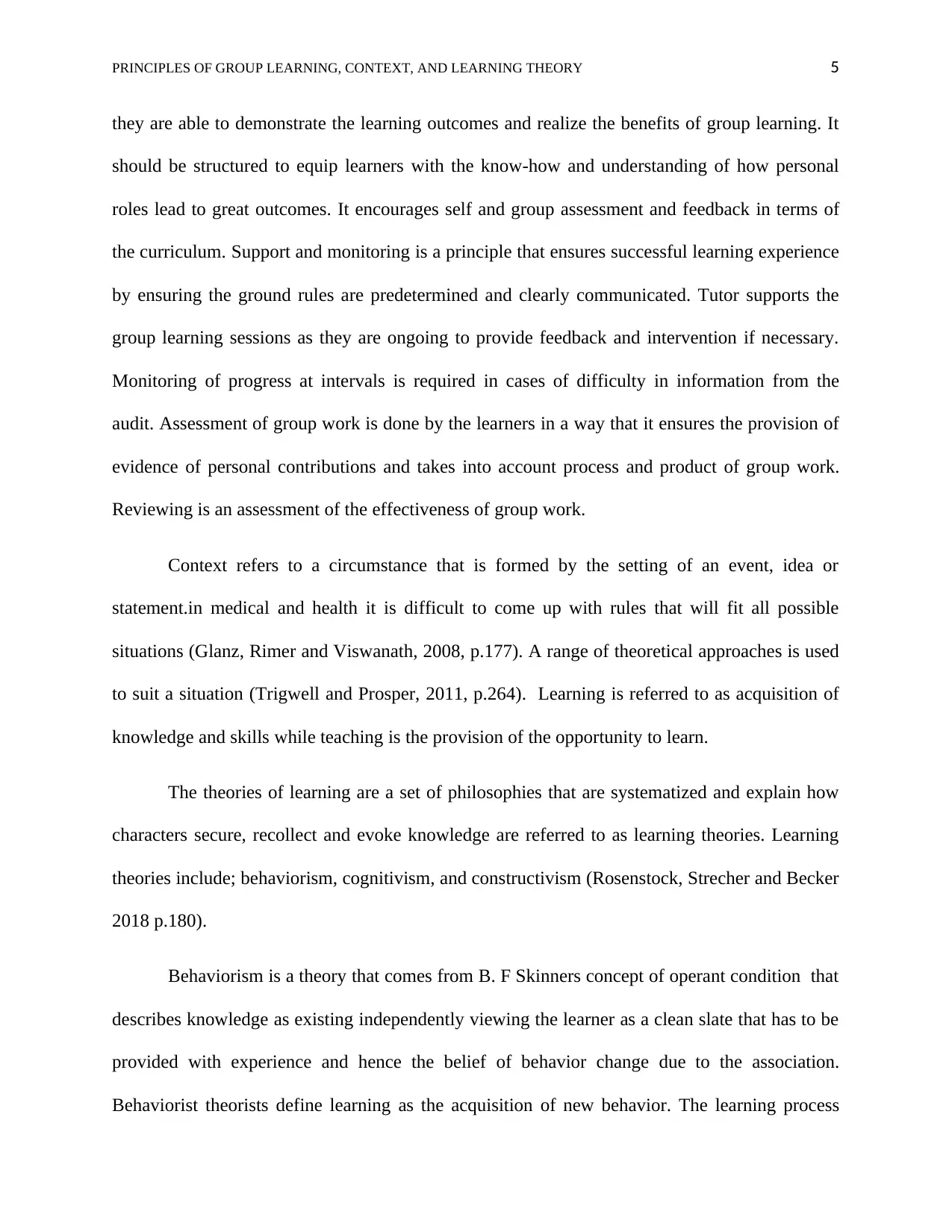
PRINCIPLES OF GROUP LEARNING, CONTEXT, AND LEARNING THEORY 5
they are able to demonstrate the learning outcomes and realize the benefits of group learning. It
should be structured to equip learners with the know-how and understanding of how personal
roles lead to great outcomes. It encourages self and group assessment and feedback in terms of
the curriculum. Support and monitoring is a principle that ensures successful learning experience
by ensuring the ground rules are predetermined and clearly communicated. Tutor supports the
group learning sessions as they are ongoing to provide feedback and intervention if necessary.
Monitoring of progress at intervals is required in cases of difficulty in information from the
audit. Assessment of group work is done by the learners in a way that it ensures the provision of
evidence of personal contributions and takes into account process and product of group work.
Reviewing is an assessment of the effectiveness of group work.
Context refers to a circumstance that is formed by the setting of an event, idea or
statement.in medical and health it is difficult to come up with rules that will fit all possible
situations (Glanz, Rimer and Viswanath, 2008, p.177). A range of theoretical approaches is used
to suit a situation (Trigwell and Prosper, 2011, p.264). Learning is referred to as acquisition of
knowledge and skills while teaching is the provision of the opportunity to learn.
The theories of learning are a set of philosophies that are systematized and explain how
characters secure, recollect and evoke knowledge are referred to as learning theories. Learning
theories include; behaviorism, cognitivism, and constructivism (Rosenstock, Strecher and Becker
2018 p.180).
Behaviorism is a theory that comes from B. F Skinners concept of operant condition that
describes knowledge as existing independently viewing the learner as a clean slate that has to be
provided with experience and hence the belief of behavior change due to the association.
Behaviorist theorists define learning as the acquisition of new behavior. The learning process
they are able to demonstrate the learning outcomes and realize the benefits of group learning. It
should be structured to equip learners with the know-how and understanding of how personal
roles lead to great outcomes. It encourages self and group assessment and feedback in terms of
the curriculum. Support and monitoring is a principle that ensures successful learning experience
by ensuring the ground rules are predetermined and clearly communicated. Tutor supports the
group learning sessions as they are ongoing to provide feedback and intervention if necessary.
Monitoring of progress at intervals is required in cases of difficulty in information from the
audit. Assessment of group work is done by the learners in a way that it ensures the provision of
evidence of personal contributions and takes into account process and product of group work.
Reviewing is an assessment of the effectiveness of group work.
Context refers to a circumstance that is formed by the setting of an event, idea or
statement.in medical and health it is difficult to come up with rules that will fit all possible
situations (Glanz, Rimer and Viswanath, 2008, p.177). A range of theoretical approaches is used
to suit a situation (Trigwell and Prosper, 2011, p.264). Learning is referred to as acquisition of
knowledge and skills while teaching is the provision of the opportunity to learn.
The theories of learning are a set of philosophies that are systematized and explain how
characters secure, recollect and evoke knowledge are referred to as learning theories. Learning
theories include; behaviorism, cognitivism, and constructivism (Rosenstock, Strecher and Becker
2018 p.180).
Behaviorism is a theory that comes from B. F Skinners concept of operant condition that
describes knowledge as existing independently viewing the learner as a clean slate that has to be
provided with experience and hence the belief of behavior change due to the association.
Behaviorist theorists define learning as the acquisition of new behavior. The learning process
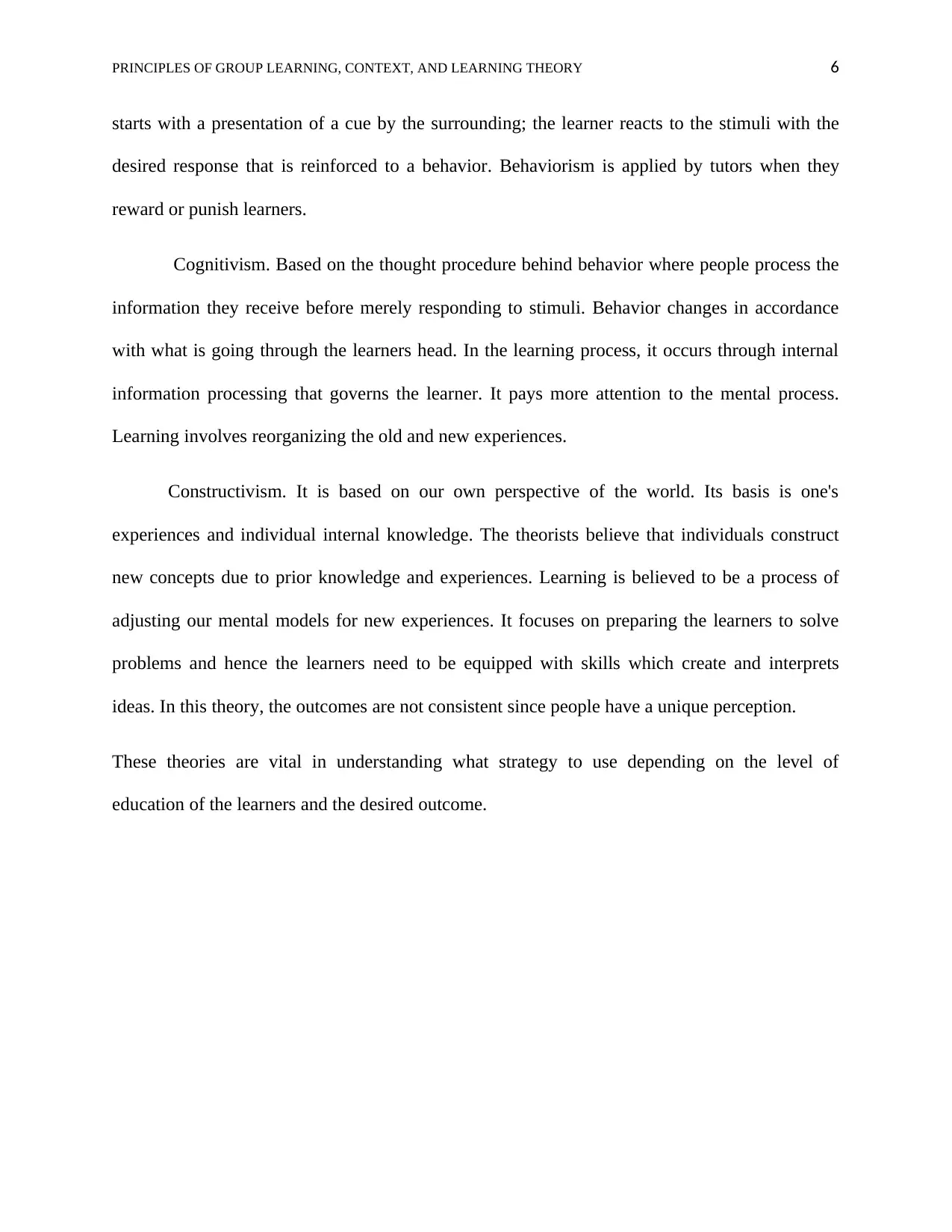
PRINCIPLES OF GROUP LEARNING, CONTEXT, AND LEARNING THEORY 6
starts with a presentation of a cue by the surrounding; the learner reacts to the stimuli with the
desired response that is reinforced to a behavior. Behaviorism is applied by tutors when they
reward or punish learners.
Cognitivism. Based on the thought procedure behind behavior where people process the
information they receive before merely responding to stimuli. Behavior changes in accordance
with what is going through the learners head. In the learning process, it occurs through internal
information processing that governs the learner. It pays more attention to the mental process.
Learning involves reorganizing the old and new experiences.
Constructivism. It is based on our own perspective of the world. Its basis is one's
experiences and individual internal knowledge. The theorists believe that individuals construct
new concepts due to prior knowledge and experiences. Learning is believed to be a process of
adjusting our mental models for new experiences. It focuses on preparing the learners to solve
problems and hence the learners need to be equipped with skills which create and interprets
ideas. In this theory, the outcomes are not consistent since people have a unique perception.
These theories are vital in understanding what strategy to use depending on the level of
education of the learners and the desired outcome.
starts with a presentation of a cue by the surrounding; the learner reacts to the stimuli with the
desired response that is reinforced to a behavior. Behaviorism is applied by tutors when they
reward or punish learners.
Cognitivism. Based on the thought procedure behind behavior where people process the
information they receive before merely responding to stimuli. Behavior changes in accordance
with what is going through the learners head. In the learning process, it occurs through internal
information processing that governs the learner. It pays more attention to the mental process.
Learning involves reorganizing the old and new experiences.
Constructivism. It is based on our own perspective of the world. Its basis is one's
experiences and individual internal knowledge. The theorists believe that individuals construct
new concepts due to prior knowledge and experiences. Learning is believed to be a process of
adjusting our mental models for new experiences. It focuses on preparing the learners to solve
problems and hence the learners need to be equipped with skills which create and interprets
ideas. In this theory, the outcomes are not consistent since people have a unique perception.
These theories are vital in understanding what strategy to use depending on the level of
education of the learners and the desired outcome.
⊘ This is a preview!⊘
Do you want full access?
Subscribe today to unlock all pages.

Trusted by 1+ million students worldwide
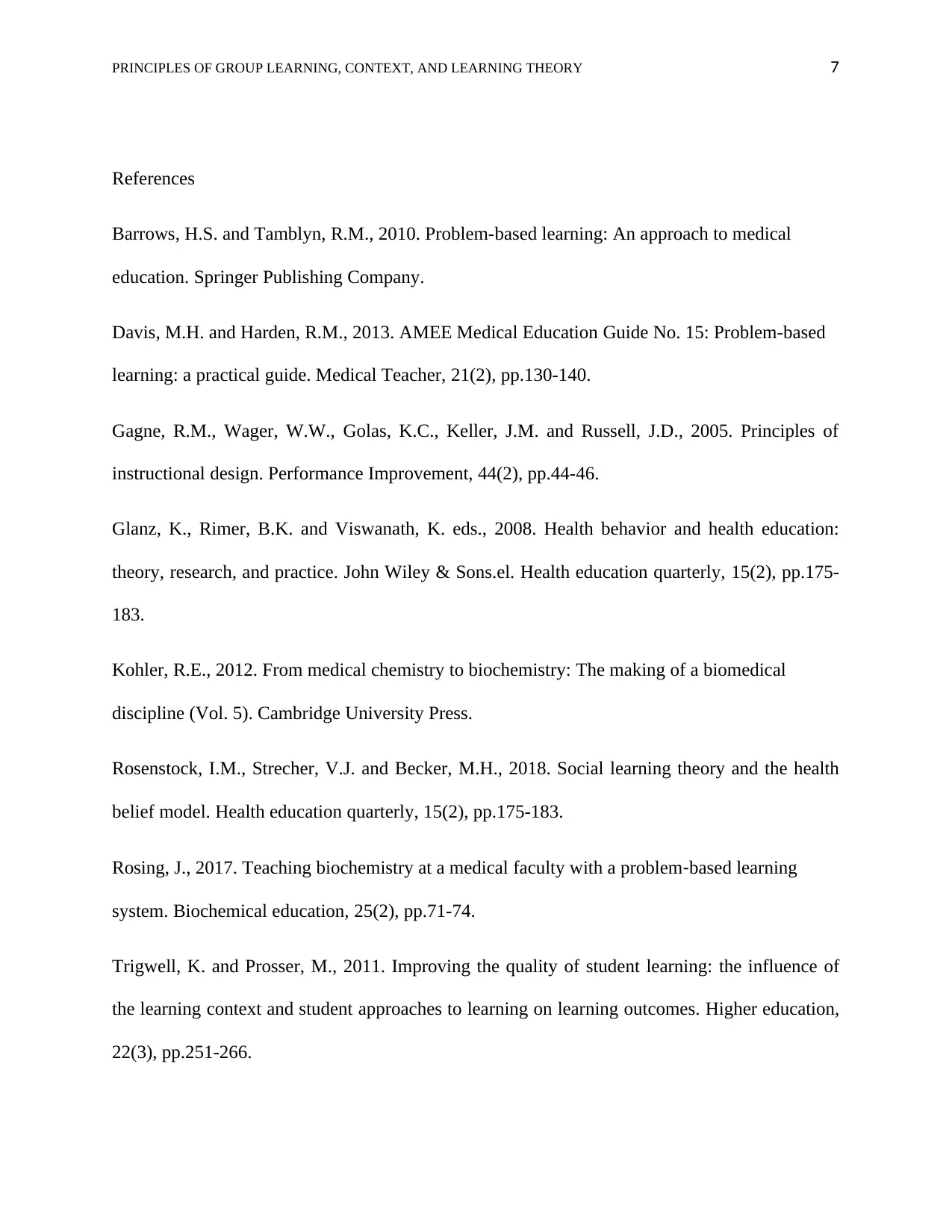
PRINCIPLES OF GROUP LEARNING, CONTEXT, AND LEARNING THEORY 7
References
Barrows, H.S. and Tamblyn, R.M., 2010. Problem-based learning: An approach to medical
education. Springer Publishing Company.
Davis, M.H. and Harden, R.M., 2013. AMEE Medical Education Guide No. 15: Problem-based
learning: a practical guide. Medical Teacher, 21(2), pp.130-140.
Gagne, R.M., Wager, W.W., Golas, K.C., Keller, J.M. and Russell, J.D., 2005. Principles of
instructional design. Performance Improvement, 44(2), pp.44-46.
Glanz, K., Rimer, B.K. and Viswanath, K. eds., 2008. Health behavior and health education:
theory, research, and practice. John Wiley & Sons.el. Health education quarterly, 15(2), pp.175-
183.
Kohler, R.E., 2012. From medical chemistry to biochemistry: The making of a biomedical
discipline (Vol. 5). Cambridge University Press.
Rosenstock, I.M., Strecher, V.J. and Becker, M.H., 2018. Social learning theory and the health
belief model. Health education quarterly, 15(2), pp.175-183.
Rosing, J., 2017. Teaching biochemistry at a medical faculty with a problem‐based learning
system. Biochemical education, 25(2), pp.71-74.
Trigwell, K. and Prosser, M., 2011. Improving the quality of student learning: the influence of
the learning context and student approaches to learning on learning outcomes. Higher education,
22(3), pp.251-266.
References
Barrows, H.S. and Tamblyn, R.M., 2010. Problem-based learning: An approach to medical
education. Springer Publishing Company.
Davis, M.H. and Harden, R.M., 2013. AMEE Medical Education Guide No. 15: Problem-based
learning: a practical guide. Medical Teacher, 21(2), pp.130-140.
Gagne, R.M., Wager, W.W., Golas, K.C., Keller, J.M. and Russell, J.D., 2005. Principles of
instructional design. Performance Improvement, 44(2), pp.44-46.
Glanz, K., Rimer, B.K. and Viswanath, K. eds., 2008. Health behavior and health education:
theory, research, and practice. John Wiley & Sons.el. Health education quarterly, 15(2), pp.175-
183.
Kohler, R.E., 2012. From medical chemistry to biochemistry: The making of a biomedical
discipline (Vol. 5). Cambridge University Press.
Rosenstock, I.M., Strecher, V.J. and Becker, M.H., 2018. Social learning theory and the health
belief model. Health education quarterly, 15(2), pp.175-183.
Rosing, J., 2017. Teaching biochemistry at a medical faculty with a problem‐based learning
system. Biochemical education, 25(2), pp.71-74.
Trigwell, K. and Prosser, M., 2011. Improving the quality of student learning: the influence of
the learning context and student approaches to learning on learning outcomes. Higher education,
22(3), pp.251-266.
Paraphrase This Document
Need a fresh take? Get an instant paraphrase of this document with our AI Paraphraser

PRINCIPLES OF GROUP LEARNING, CONTEXT, AND LEARNING THEORY 8
1 out of 8
Your All-in-One AI-Powered Toolkit for Academic Success.
+13062052269
info@desklib.com
Available 24*7 on WhatsApp / Email
![[object Object]](/_next/static/media/star-bottom.7253800d.svg)
Unlock your academic potential
Copyright © 2020–2026 A2Z Services. All Rights Reserved. Developed and managed by ZUCOL.

